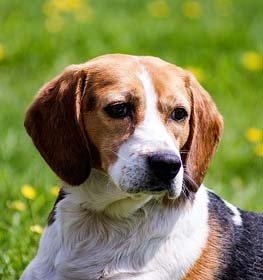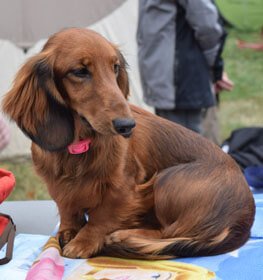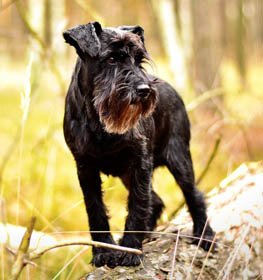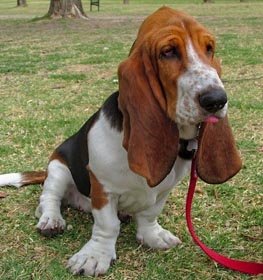Africanis Information & Dog Breed Facts
Collection of all the general dog breed info about Africanis so you can get to know the breed more.
| Group | Hunting Dogs |
|---|---|
| Popularity Rank | 511 |
| Reviews | 5 |
| User Ratings | |
|
Compare the Africanis With Other Dogs
Select at least one dog breed to make the comparsion. | |
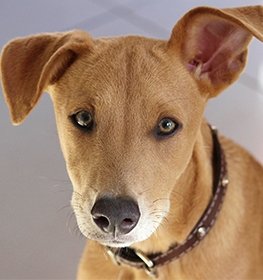 | |
| Origin | |
|
Common Names & Aliases
What other names is an Africanis known by? Discover all traditional, regional and informal names used for this breed. | Bantu DogHottentot Hunting DogKhoikhoi DogTswana breed dogUmbwa Wa Ki-ShenziZulu DogAfrican Dog |
|---|---|
|
Breed Classification
What type of dog breed is an Africanis? Learn about its genetic classification and breeding category. | Purebred |
|
Size Classification
What size category is an Africanis? Learn how big the Africanis breed typically grows. | Medium |
|---|---|
|
Weight Statistics
How much does an Africanis weigh? Discover typical weight ranges for adult males and females of the Africanis breed. | 55-100 inches (25-45 kg) |
|
Average Weight
What is the average weight of an Africanis? | 55-100 inches (35 kg) |
|
Height
How tall is the Africanis? Africanis height: | 20-24 inches (50-60 cm) |
|
Average Height
What is the average height of an Africanis? | 22 inches (55 cm) |
|
Price Range
How much does an Africanis puppy cost? Find current market prices and factors affecting Africanis costs. | $300-$500 If you choose to purchase the Africanis, you should know that the mentioned amount of money is an average of the collected data from breeders’ sites and puppy finder places. If you have a Africanis for sale, please advertise it on a reliable website to make sure the Africanis gets to a happy place. |
|---|---|
|
Availability
How easy is it to get a Africanis? How many Africanis are there in the world? | Rare: You may rarely see each other in everyday life, but you might catch a glimpse of each other at dog shows. There are very few of them, and there have been times when they have almost drifted to the brink of extinction, so few are left. |
|
Intelligence Rating
How intelligent is an Africanis? Discover the Africanis's intelligence ranking and learning capabilities. | Smart: The Africanis dogs have great intelligence. They understand and memorize new commands in 15-25 repetitions.
The Africanis is among the smartest dogs in the intelligence ranking. |
|---|---|
|
Training Difficulty
How easy is it to train an Africanis? Learn about the Africanis's trainability and response to training methods. | Africanis dogs are easy to train. They find out the association between commands and actions quite quickly. |
|
Watchdog Rating
How good is an Africanis as a watchdog? Learn about the Africanis's alertness and guarding instincts. | Africanis dogs are good watchdogs. Their main job is to observe and they're consistent in their effort. Good vocal cords and a sense of hearing belong to them. Usually, they're territorial and protective about their property, so the Africanis dogs will alert you if they sense something different.
|
|
Territorial Protection
Is an Africanis protective of its territory? Learn about the Africanis's guarding instincts and behavior. | Africanis dogs strongly protect their territory. This breed is a complete security guard, so you don't have to be afraid in case of danger. |
|
Personality Traits
What personality does an Africanis have? Learn about characteristic Africanis temperament and behavior traits. | IndependentProtectiveFriendlyAffectionateObedientTerritorialTrainableWatchful |
|---|---|
|
Sensitivity Level
How sensitive are they? Africanis sensitivity: | Africanis dogs have an average emotional level and are not the most sensitive dog breed. Sometimes it's okay to change the daily routine, have guests and listen to loud music.
Some dogs handle moderate punishment very well, while others crumble apart at a dirty look. This breed is not affected emotionally by moderate punishment. |
|
Affection Level
How affectionate are they? Is an Africanis a good family dog? | Average to High: Africanis dogs are highly affectionate dogs. They like being involved in the family's life. This breed isn't considered an aloof dog. |
|
Social Needs
How much social interaction does the Bantu Dog need? Africanis social needs: | Africanis dogs are a social breed. They enjoy being around people or other animals. This breed doesn't tolerate being left alone. |
|
Impulse to Wander or Roam
How likely is the Africanis to run away? Does this breed explore or wander a lot? Does Africanis roam? | Africanis dogs have average wanderlust potential. Sometimes they like to explore the world and they might escape once or twice, but usually, they prefer staying safely at home. Safer to teach them how to get back to you on command. |
|
Prey Drive
Do this canine have a strong prey drive? Does Africanis have high prey drive? | Africanis dogs have an average prey drive, which means that they don't have a high impulse to chase and catch something like a cat or any other small aminals, but it might happen. Training can help to achieve good behavior. |
|
Barking Frequency
Does an Africanis bark a lot? Learn about typical Africanis vocalization patterns and triggers. | Average: The Africanis barks occasionally. They can change their barks depending on their emotional level and what they're trying to say. Different barks could mean the same and the same barks could have different meanings.
Top reasons for barking: protection, alarm, fear, boredom, attention-seeking, greeting, separation anxiety, compulsive barking. |
|---|---|
|
Playful Nature
How playful is an Africanis? Understand the typical play drive and energy level of the Africanis breed. | The Africanis is a playful breed. Excited barking and sometimes nipping will alert you to play. |
|
Apartment Adaptability
Can an Africanis live in an apartment? Learn about the Africanis's suitability for apartment living. | It is not recommended to keep the Africanis breed in the home. It does best in the garden, but if you do want to keep it indoors, it should be exercised thoroughly with long daily walks, so you can keep the Africanis indoors by introducing daily routines. |
|
Lifestyle Adaptability
How adaptable is an Africanis to lifestyle changes? Learn about the Africanis's flexibility to new situations. | Average: Africanis dogs adapt to lifestyle changes and different living environments quite okay usually. |
|---|---|
|
Alone Time Tolerance
Can an Africanis be left alone? Learn about the Africanis's tolerance to solitude. | Africanis dogs do best when a family member is at home during the day or if their workplace is dog-friendly so they can take the dog at work. |
|
Bite Risk Assessment
What is an Africanis biting potential? Learn about the Africanis's bite risk factors. | Low 🔽 The Africanis has a low chance of biting somebody. Top reasons for dog bite: protection, pain, excitement, herding instinct, being provoked. (Data based on the available online bite statistics.) |
|---|---|
|
Mouthing Tendency
Is an Africanis mouthy? Learn about the Africanis's tendency to use mouth during play. | Africanis dogs have an average tendency to nip, chew, playbite, or herd people. It's a common habit during puppyhood, not aggressive behavior. These "bites" don't hurt, but Africanis dogs need to be taught a good attitude. |
|
Bite Strength Rating
How strong is an Africanis bite? Learn about the Africanis's bite force measured in PSI. | Between 200 and 400 PSI ⏺ Africanis bite force: Ordinary. Bite force Africanis measurements typically fall within the range of 200 to 400 PSI. The bite force of an Africanis is considered ordinary when compared to other dog breeds, but it is still quite powerful. This Africanis bite force PSI can cause bite wounds. Africanis bite PSI is not something that should be feared if the dog is well-trained and managed. To avoid any issues, it's essential to learn how to train an Africanis puppy not to bite from an early age.
The Africanis, and many others, have a fearsome presence because they have significant jaw strength, so it is important not to anger the dog and have it around strangers until it is fully trained. However, they are usually quite calm and good companions, they work well in families and are easy to care for. In conclusion, while the Africanis bite force is certainly an interesting aspect of the breed, it is important not to let it overshadow the many other reasons why these dogs are so loved and respected. With proper training and socialization, an Africanis can be a loyal and protective companion for your family. |
|
Average Lifespan
How long does an Africanis live? Learn about the typical lifespan of the Africanis breed. | 10-12 years The average lifespan of Africanis: 11 years |
|---|---|
|
Climate Tolerance
How well does an Africanis handle different weather? Learn about the Africanis's climate adaptability. | Prefers average to warm weather conditions Different dogs have different preferences when it comes to weather conditions. However, in general, most dogs prefer average to warm weather conditions, as they typically find hot weather conditions to be uncomfortable and taxing. |
|
Health Concerns
What health issues are common in an Africanis? Discover typical conditions affecting the Africanis breed. | Africaniss tend to have more frequent health issues than other breeds. Regular vet check-ups are needed.
|
|
Vet Care Frequency
How often does an Africanis need vet visits? Learn about the Africanis's veterinary care requirements. | Frequent The Africanis should have a complete physical check-up at least once (but preferably twice) per year. If your dog shows any symptoms, call your veterinarian. |
|
Health Problems
What genetic/health problems does the Africanis breed have? What are the health issues and concerns of the Africanis breed? Most common health risks of Africanis: | CancerDermoid SinusParvovirusRabies |
|
Energy Rating
How energetic is an Africanis? Understand daily activity needs of the Africanis breed. | Africanis dogs have a higher energy level than other dog breeds. If you want a dog for snuggling on the couch, this breed isn't the perfect choice for you. |
|---|---|
|
Activity Requirement / Exercise Need
How much exercise does an Africanis need? How much exercise do Africanis dogs require per day?
Do Africanis dogs need a lot of exercises? | Africanis dogs need quite a lot of exercise. Daily walks should be on schedule. If you live an active life, this breed can be a good choice for you. |
|
Sleeping Need
How much sleep does the Africanis breed need? | Africanis dogs are quite energetic dogs and they don't spend too much time with sleeping. If you live an active life, this breed can be a good choice for you. |
|
Obesity Tendency
Is an Africanis prone to weight gain? Learn about the Africanis's obesity risks. | Low to Average: The Africanis has a low to the average risk for obesity. To make your dog happy and fit, feed him with quality dry dog food and live an active life together. Try to find the happy medium between exercise and feeding.
If you notice any weight gain, consult your veterinarian and make a diet plan. Reduce unhealthy food and snacks, and measure the Africanis weight regularly. |
|---|---|
|
Food Consumption
How much food does an Africanis need daily? Learn about the Africanis's feeding requirements. | 2.5 to 3.5 cups of a high-quality dog food daily, divided into two meals. |
|
Allergy Friendliness
Is an Africanis hypoallergenic? Learn about the Africanis's suitability for allergy sufferers. | No Africanis dogs don't do well with allergy sufferers by causing allergic reactions. Some dog breeds are even considered to higher possibility of an allergic response. Coat type isn't necessarily relevant, because most people are allergic to dander (flakes on the dog's skin) or saliva, not actually to dog hair. |
|---|---|
|
Coat Colors
What colors does an Africanis come in? Discover all possible Africanis color variations. | BlackTan White Brown |
|
Grooming Requirements
How much grooming does an Africanis need? Learn about Africanis coat maintenance requirements. | Easy to groom: The Africanis doesn't require a lot of grooming. Seasonal flea treatment is needed, but cutting the dog's hair by a professional groomer isn't necessary. Ears and eyes should be cleaned regularly to avoid infections. Africanis is a good choice if you don't have the time, skill, or money to take care of a high-maintenance dog. Recommended for beginners. |
|
Drooling Tendency
Does an Africanis drool a lot? Learn about the Africanis's drooling habits. | The Africanis is a perfect example of a very low drooling tendency. If you're disgusted by slobber spots on your clothes, the Africanis could be a perfect choice for you. Drooling is the unintentional saliva flowing outside of the mouth. It can be completely normal or a sign of a health problem. Certain dog breeds drool minimum compared to others, just like the Africanis.
If you notice any change in your dog's drooling habit, you should contact a vet as soon as possible. |
|
Stinkiness Rating
Does an Africanis smell bad? Learn about the Africanis's natural odor levels. | Medium ⏺ The Africanis has an average chance of bad smell. Top reasons for dog stinkiness: infection of bad tooth/ear/skin folds, gas attacks. |
|
Coat Characteristics
What type of coat does an Africanis have? Learn about the Africanis's fur characteristics. | WiryThick |
|
Bathing Needs
How often does an Africanis need baths? Learn about the Africanis's bathing requirements. | 6-8 weeks Rarely. Bathing your dog is beneficial to them in more ways than just one. It’s also a good time to look for unusual scratches, bumps, fleas, and other irregularities. When their hair is wet and flat against their body, these details are more visible.
For example, short-haired dog breeds can go a very long time in between baths. These short-haired breeds shed regularly and that shedding works to naturally remove excess dirt and oil. So unless your weenie dog got into the garbage can, you can probably hold off on a bath for a while. |
|
Shedding Level
How much do Africanis dogs shed? How to control, reduce and prevent the shedding of the Bantu Dog? Do Africanis dogs shed a lot? | Africanis dogs are low shedders. It's a natural process of the hair growth cycle. The amount and frequency of hair loss mostly depend on their health status and breed type. |
|
Child Compatibility
Is an Africanis good with children? Learn about the Africanis's behavior around kids of different ages. | Africanis dogs are kid-friendly dogs. This breed is a good choice if you have children. |
|---|---|
|
Pet Compatibility
How well does an Africanis get along with other pets? Discover the Africanis's compatibility with other animals. | Africanis dogs are usually friendly towards other pets. |
|
Stranger Friendly
Are they aggressive or friendly towards/with strangers? Africanis temperament with other people: | Africanis dogs are average friendly towards strangers. |
|
Cat Friendly
How well do Africanis dogs get along with cats? Are they good with kittens? What is this fido's temperament with cats? Can they be good with cats? Can the Africanis breed live with a cat? | Africanis dogs are cat-friendly dogs. |
|
Dog Friendly
Is Africanis good with other dogs? Are they dog-friendly dogs? How well do Africanis dogs get along with other dogs? | Africanis dogs are average friendly towards other dogs. |
|
Good For First Time Owners
Is Africanis breed good for first-time owners? Do they make a good dog for novice owners? Is Africanis breed suitable for first-time owners? | Yes Africanis dogs are good for novice owners, due to their easy-going personality. |
|
Office Friendly
Are Africanis dogs good office canines? Do Africanis dogs make good office-friendly pets? Can they be office dogs? | No Africanis is not the best dog breed for office environment. |
|
Senior Citizens Friendly
Are they senior citizens friendly dogs? How well do Africanis dogs get along with the elderly people? What is the Bantu Dog temperament with senior people? Are Africanis dogs good for elderly owners? | Africaniss are usually recommended for elderly people. |
|
Service Dog Capability
Can an Africanis be a service dog? Learn about the Africanis's service work potential. | Not really This breed generally not used as a service dog. A service dog is a term used in the USA to refer to any type of assistance dog specifically trained to help people who have disabilities, such as visual impairment, hearing impairments, mental disorders, seizures, mobility impairment, and diabetes. Service dogs are protected under the ADA (Americans with Disabilities Act).
Africanis is not the best breed for service purposes. |
|---|---|
|
Therapy Work Suitability
Is an Africanis good as a therapy dog? Learn about the Africanis's therapy work aptitude. | Not really This breed is generally not used as a therapy dog. A therapy dog is a dog that might be trained to provide affection, comfort, and love to people in hospitals, retirement homes, nursing homes, schools, hospices, disaster areas, and people with anxiety disorders or autism.
Africanis is not the best breed for therapeutic purposes. |
|
Scent Detection Ability
Is an Africanis good at detection work? Learn about the Africanis's scenting abilities. | Not really They are not typically employed for this type of work, but there may be exceptional cases. A detection dog or sniffer dog is a dog that is trained to use its senses (mostly its smell) to detect substances such as explosives, illegal drugs, wildlife scat, currency, blood, and contraband electronics such as illicit mobile phones.
Africanis is not the best breed for detection purposes. |
|
Search & Rescue Potential
Can an Africanis do search and rescue? Learn about the Africanis's SAR capabilities. | Not really This dog breed is not typically used as a search and rescue dog. The use of dogs in search and rescue (SAR) is a valuable component in wilderness tracking, natural disasters, mass casualty events, and locating missing people.
The Africanis is not the best breed for SAR purposes. |
|
Maritime Work Ability
Is an Africanis good on boats? Learn about the Africanis's maritime capabilities. | Not really Africanis breed usually doesn't like being on a boat. Boat dogs were typically bred for their strength, stamina, and water resistance, as they were often required to perform tasks such as pulling in fishing nets, and jumping into the water to retrieve ropes or lines, or helping to move cargo. Sailor dog is a type of dog that was bred to accompany sailors on their voyages. They were typically used for three purposes: as a working dog, a watchdog, and as a companion. A boat dog is a term used to describe a type of dog that was traditionally bred and used as a working dog on boats. |
|
Draft Work Capability
Can an Africanis pull carts? Learn about the Africanis's drafting abilities. | Not really A drafting dog or draft dog is a dog bred and used for cart pulling. Dogs bred for this work have strong builds and qualities that are needed, strength and determination.
Africanis is not the best breed for drafting purposes. |
|
Military Service Background
Was an Africanis used in military service? Learn about the Africanis's military history. | Not really In history, this breed was not really used for combat dog. |
|
Puppy Litter Size
How many puppies does an Africanis usually have? Learn about typical litter sizes. | 2-8 puppies |
|---|---|
|
Pregnancy Duration
How long is an Africanis pregnant? Learn about the Africanis's gestation period. | 60-64 days Reproductive cycle of the female Africanis: The first period called Proestrus lasts for about 9 days.
During this time the females start to attract males. You can notice by swelling vulva and bloody discharge. The second part is the Estrus when the female is receptive for the male. It lasts for about 3 to 11 days. The sign of the proestrus part is the soft and enlarged vulva. The discharge decreases and lightens in color. The third part is the Diestrus. Normally, it occurs around day 14. In this period the female’s discharge changes for vivid red and coming to its end. The vulva returns to average, and she will no longer permit mating. The fourth part called the Anestrus. The time frame between heat periods normally lasts about six months. |
|
Breeding Frequency
How often can an Africanis have puppies? Learn about safe breeding intervals. | Once a year. More frequent breeding is not healthy. It is very important not to buy a dog from a puppy mill, where the needs of the pups and their mothers are ignored. It's an inhumane high-volume dog breeding facility, where puppies born several times a year. |
|
AKC Classification
What AKC group is an Africanis in? Learn about the Africanis's AKC classification. | Not recognized by the American Kennel Club. |
|---|---|
|
FCI Classification
What FCI group is an Africanis in? Learn about the Africanis's international classification. | Not recognized by FCI. |
Africanis Pros and Cons
- Intelligence Rating: Smart: The Africanis dogs have great intelligence.
- Training Difficulty: Africanis dogs are easy to train.
- Grooming Requirements: Easy to groom: The Africanis doesn't require a lot of grooming.
- Shedding Level: Africanis dogs are low shedders.
- Drooling Tendency: The Africanis is a perfect example of a very low drooling tendency.
- Obesity Tendency: Low to Average: The Africanis has a low to the average risk for obesity.
- Watchdog Rating: Africanis dogs are good watchdogs.
- Child Compatibility: Africanis dogs are kid-friendly dogs.
- Cat Friendly: Africanis dogs are cat-friendly dogs.
- Senior Citizens Friendly: Africaniss are usually recommended for elderly people.
- Good For First Time Owners: Africanis dogs are good for novice owners, due to their easy-going personality.
- Health Concerns: Africaniss tend to have more frequent health issues than other breeds.
- Allergy Friendliness: Africanis dogs don't do well with allergy sufferers by causing allergic reactions.
- Apartment Adaptability: It is not recommended to keep the Africanis breed in the home.
- Alone Time Tolerance: Africanis dogs do best when a family member is at home during the day or if their workplace is dog-friendly so they can take the dog at work.
- Office Friendly: Africanis is not the best dog breed for office environment.
Africanis History
Besides the unique name, this breed has a unique origin story too. And what makes the history of this breed so different? It is the fact that they were shaped only by natural selection throughout the centuries and developed without almost any human intervention or breeding process.
For many years these dogs were considered as mongrels in the South African country and only in the 21st century as a result of the work of two dog experts Johan Gallant and Joseph Sithole - who spent years studying and examining these dogs – that they began to lose the stigma of a street dog and started to be seen as a breed of smart, tough and ancient dogs. The name Africanis comes from Gallant, one of the experts, by mixing two words: canis (which means dog in Latin) and Africa. The Africanis Society was also created by Gallant.
Speaking of ancient ancestors, the Africanis has a proven lineage going back about 7000 years. In Africa, no canine domestication took place and the ascendents of the Africanis were domesticated in the East from where they came to Africa with the help of human migration. It is said that the Africanis is the descendent of the dogs of early Egypt. This theory is supported by the fossils found near the Nile and experts say that the ascendants of the Africanis were wild wolves of Arabia and India that probably arrived at the Eastern part of the continent during the Stone Age. From there they spread rapidly, migrating to the Southern part of Africa. The earliest evidence found of this breed in South Africa were some remains near the borders of Botswana from 570 AD.
Today some of these dogs still live in tribal areas but the everchanging culture and landscape of Africa mean a huge threat to the existence of the true Africanis. Although this breed has been living in the continent for centuries, it is only recognized by the Kennel Union of Southern Africa as an emerging breed.
Latest Africanis Compares
Africanis Names
How old is my Africanis in human years?
You May Also Like
Rate The Africanis Breed
Africanis Comments, Reviews and Questions
- Lira
Feb 14, 2024, 9:14:34 PM:
They are the best as family members.
- Beth
Mar 17, 2023, 12:30:27 PM:
- Meg N. Green
Oct 13, 2021, 10:11:31 PM:
I swear to God, she makes me laugh every day, some days more than once! Every day with her is a joy. I feel really blessed to have her in my life!
- guill
Dec 1, 2019, 12:49:58 PM:
- Coubras
Nov 28, 2019, 10:13:32 AM:

